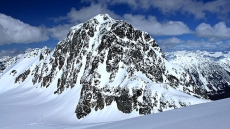VANCOUVER — You might say it's a story about the fish that didn't get away.
Fishermen in the Bering Sea off the coast of Alaska are tossing back millions of kilograms of dead halibut they've caught unintentionally while scooping up other stocks.
The longtime practice, known as bycatch, has become the focus of intense scrutiny in Alaska and will be the subject of debate at a meeting at month's end of the International Pacific Halibut Commission in Vancouver.
What's at fault depends on who is talking. Some blame government regulations that forbid fishermen from keeping bycatch, others say it's because of fish sorting-and-recording methods, and still others point to Alaska's failure to follow the lead of British Columbia, Washington, Oregon and California.
Chris Oliver, executive director of the North Pacific Fishery Management Council, one of two U.S. agencies that manages the Alaskan fishery, said the public shouldn't forget the market, either.
"Yes, it's a lot of halibut thrown over." he said. "But again, you know, it supports a two-million-metric-ton groundfish fishery worth billions of dollars to this U.S. economy. In fairness, yes, there's a lot of wastage of halibut."
Halibut can grow longer than 2.4 metres and weigh more than 225 kilograms. They swim as deep as 460 metres for much of the year and double that depth during the winter spawning months.
The responsibility for managing the species between northern California and Alaska rests with international and national agencies. Quotas are set by the international commission, while bycatch in B.C. is managed by Fisheries and Oceans Canada, and in Alaska by the North Pacific Fishery Management Council and the National Marine Fisheries Service.
Ian Stewart, a scientist at the Seattle-based halibut commission, said the debate has recently focused on areas of the eastern Bering Sea.
The total halibut yield in that area this year is expected to be forecast at 1.56 million kilograms. Of that, 234,000 kilograms have been allocated to the main halibut fishery, almost 23,000 kilograms will be set aside for personal use and a so-called subsistence fishery as well as commercial wastage. A little over 1.31 million kilos have been set aside as bycatch.
Stewart said those numbers don't include an estimated 750,000 kilograms of halibut shorter than 66 centimetres.
The executive director of Seattle's Groundfish Forum, which represents five companies operating 14 factory vessels, said bycatch hasn't been ignored in Alaska, nor is this a new issue.
Chris Woodley said trawlers have cut down on bycatch in recent years and it now represents less than 0.5 per cent of all the flatfish caught in the Bering Sea and Aleutian Islands.
The issue rose to prominence last month in Alaska when fears arose that there wouldn't be enough halibut left over for its own fishery, Woodley said.
He said regulations implemented by the National Marine Fisheries Service are part of the problem.
Current regulations require that everything in a trawler's nets, whether it's targeted species such as yellowfin sole or bycatch like halibut, be sent below to the ship's factory where observers measure and sort the halibut by sex.
"All that takes about two hours, and then they're allowed to return the halibut into the water. But after two hours, you're not going to have a lot of live halibut, even though for part of that period they're in fish bins and so there is some water in that."
Woodley said the Groundfish Forum plans to ask the North Pacific Fisheries Association and the National Marine Fisheries Service for an "experimental fishery permit" that would allow fishermen to sort halibut on deck and throw them back into the ocean sooner.
He noted that deck sorting is taking place on trawlers in British Columbia, and that's significantly reducing halibut bycatch and mortality.
"The regulatory process in the United States, particularly in fishery management through the council, can take two to three years."
Buck Laukitis, a past president of the North Pacific Fisheries Association in Alaska, said groundfish fisheries have been doing well but there's been a lack of political will to address the issue.
Laukitis said coastal communities suffer when so much halibut goes to waste.
"Halibut is the second-most important fishery to small boat fishermen in Alaska," he said. "First is salmon, second is halibut, third is cod."
Laukitis said he wants the international body to do a better job co-ordinating the fishery with the Alaskan regulatory agencies.
Bruce Leaman, the international commission's executive director, said Alaska hasn't followed practices in B.C., Washington, Oregon and northern California, where trawlers are bound by what's known as individual bycatch quotas.
Vessels there must stop fishing if they exceed their bycatch limit, although some jurisdictions allow for the trading of quotas.
In B.C., Leaman said, the government has implemented a comprehensive, integrated groundfish management plan that has individual quotas for almost all species.
Leaman said he expects the commission to spend at least an afternoon discussing the issue in Vancouver during the week-long meeting starting Jan. 26.
"It is not a trivial issue by any stretch, nor an easy one to solve," he said. "People have been working on this for 30 years now."





